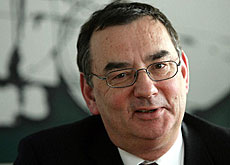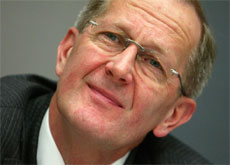Swiss stick to their guns over trade deal

Switzerland's chief trade negotiator has repeated that progress must be made in all areas – not just agriculture – if a global deal is to be reached by April.
Luzius Wasescha was speaking ahead of Friday’s meeting of around 30 trade ministers at the annual World Economic Forum session in Davos.
The talks, hosted by Swiss Economics Minister Joseph Deiss, will mark the first time ministers have met since making limited progress on a global trade deal in Hong Kong last month.
The 149 members of the Geneva-based World Trade Organization (WTO) agreed to end all forms of agricultural export subsidies by 2013 and to make modest cuts in other trade barriers.
But they failed to achieve a breakthrough on the main sticking point: a detailed set of formulas for cutting farm and industrial tariffs and subsidies. Instead ministers set a new deadline of April 30.
“I think it’s very good that ministers are meeting at this juncture to make a reality check and see whether the nice promises they made among themselves have been followed up or not,” said Wasescha on Wednesday.
The Swiss ambassador to the WTO was speaking at a news conference in Geneva where the G10 group of net food importing countries – of which Switzerland is a member – unveiled two new proposals for unblocking the agriculture dossier.
The group, which also includes Japan and Norway, proposed reducing the overall level of trade-distorting support to farmers by between 75 and 45 per cent, against the 75-31 put forward by the United States and the 70-50 suggested by the European Union.
Under pressure
Switzerland is under pressure to substantially reduce farm subsidies and cut import tariffs on agricultural products as part of efforts to help farmers in developing countries.
But, like the EU, it wants other countries to make concessions in return on industrial goods and financial services – a position reiterated by Wasescha.
“If we really are serious with the deadlines expressed by ministers in the Hong Kong declaration… I think we will have to move in parallel both in agriculture and in non-agricultural market access,” he said.
Wasescha added that separate negotiations were continuing with Russian officials in Bern on gaining improved market access for Swiss firms.
Switzerland is one of a handful of WTO countries that have yet to endorse Russia’s application to the world trade body and is currently indulging in apparent horse-trading.
“I cannot say whether [progress] is satisfactory or not because we haven’t yet had all the answers from our Russian colleagues,” commented Wasescha.
swissinfo, Adam Beaumont with agencies
The so-called Doha Round of trade liberalisation talks, launched in 2001, should have been completed two years ago. It is hoped that it will be concluded by the end of the year.
The more developed economies are baulking at making bigger, politically sensitive cuts to farm subsidies and lowering tariffs on food imports.
Developing countries are reluctant to open their markets to goods and services unless agricultural tariffs and subsidies are cut.

In compliance with the JTI standards
More: SWI swissinfo.ch certified by the Journalism Trust Initiative


You can find an overview of ongoing debates with our journalists here. Please join us!
If you want to start a conversation about a topic raised in this article or want to report factual errors, email us at english@swissinfo.ch.